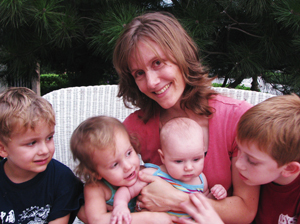
I’m standing in a parking lot, chatting with neighbors when it happens. I look down at the baby, Ainsley, and she’s choking, or gagging. I’m not sure what’s she’s doing, actually, but it looks wrong. I pick her up and she’s trembling, gasping for air.
I leave my three oldest kids right there in the parking lot and run to the clinic across the street. I figure they’ll pull a peanut or a Lego out of her and we’ll be on our way. But the nurse summons a doctor, who takes a quick look and calls for another doctor. A minute later, my baby is hooked up to an oxygen tank and an ambulance is being summoned.
Now I’m the one who’s trembling. I’ve left my stroller and my kids across the street, my car is at home, and my husband has just left the country on business. Friends know that medical emergencies seem to stalk us from country to country, so an emergency room visit isn’t unheard of. Still, I’m frightened and with my husband on a plane somewhere, I am completely, utterly alone. I clutch the baby and cry, feeling scared for her and sorry for myself.
Suddenly, familiar voices echo in the corridor. My other children have arrived, escorted by one of my neighbors. She assures me that she’ll get the kids home, so I pull myself together and hug each of them in turn, reminding them to behave. As soon as they leave, another neighbor arrives. She’s already heard the news and came straight to the clinic to wheel my stroller home for me.
Waiting there for the ambulance, I feel calmer already. I’m not as alone as I thought I was. My other kids are taken care of; I can focus on Ainsley now.
The ambulance arrives at last, and we screech down the highway, lights flashing, as a nurse monitors the baby’s breathing. We arrive at the hospital, where it’s eventually determined that we need to stay the night. I have no clean clothes, no diapers, and hardly any money. I settle into the hospital room with Ainsley, worried and exhausted.
That’s when I notice the string of text messages on my phone. My children, it seems, have all been farmed out for sleepovers at their friends’ houses. The dog has been walked. The birthday present for a party my son is supposed to attend today has been wrapped and delivered. My husband has been tracked down in Mongolia and notified. The Embassy doctor has been alerted. One neighbor is on her way to the hospital with a change of clothes and diapers, texting as she goes to find out what she can bring me from a nearby coffeehouse. I am amazed at everything my neighbors have done for me, for my family. I allow myself to relax, confident at last that I can make it through this day.
It’s said that when disaster strikes, neighbors circle the wagons to ward off danger. And circle they did. Never before in China have I felt so thoroughly protected, so surrounded by true friends.
After 24 hours in the hospital, Ainsley and I were released to return home and carry on with our lives. But in the space of those few hours, my perception of my life in Beijing changed. The support I received that day was astounding, far more than I could ever repay. That tiny band of neighbors encircled my family, doing everything they could to get us through our crisis.
I returned home to find flowers, food, and friends in my kitchen. Feeling better, Ainsley toddled around, greeting people and babbling. The other kids surrounded me, fighting over who got to tell me about their sleepover first. My friends all hugged me and waved off my efforts to thank them. I could hardly take it all in: all these people circled around me, gathered together to welcome me home.

Donna Scaramastra Gorman is a freelance writer and mother of four who has lived in Beijing for two years. Her work has appeared in Newsweek, the Washington Post and the Christian Science Monitor.



